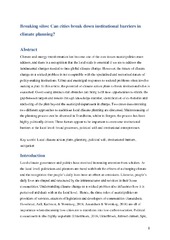Breaking silos: can cities break down institutional barriers in climate planning?
Peer reviewed, Journal article
Accepted version
Permanent lenke
https://hdl.handle.net/1956/22513Utgivelsesdato
2019Metadata
Vis full innførselSamlinger
- Department of Geography [634]
Originalversjon
Journal of Environmental Policy and Planning. 2019, 21 (4), 345-357. https://doi.org/10.1080/1523908X.2019.1623657Sammendrag
Climate and energy transformation has become one of the core issues municipalities must address, and there is a recognition that the local scale is essential if we are to address the fundamental changes needed to face global climate change. However, the nature of climate change as a wicked problem is not compatible with the specialised and sectorised nature of policy-making institutions. Urban and municipal responses to societal problems often involve making a plan. In this article, the potential of climate action plans to break institutional silos is examined. Overcoming institutional obstacles can bring forth new opportunities to shrink the gap between targets and results through knowledge transfer, identification of co-benefits and anchoring of the plan beyond the municipal department in charge. Two cases demonstrating two different approaches to ambitious local climate planning are discussed. Mainstreaming of the planning process can be observed in Trondheim, whilst in Bergen, the process has been highly politically driven. Three factors appear to be important to overcome institutional barriers at the local level: broad processes, political will and institutional entrepreneurs.
